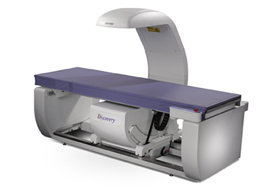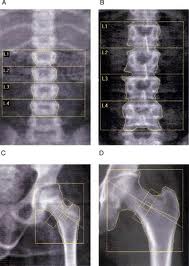| Our Radiologist and Staff |
| 1.5 T MRI Scan |
| Multi Slice CT Scan |
| Ultrasound Exam |
| Digital Mammography |
| Computed Radiography X-Ray |
| Bone Density |
| Virtual Tour |
| Womens Center |


DEXA Bone Density
Our bones and joints give us stability and mobility, the freedom to move and the strength to perform. Young and old, men and women - everyone shares the same dependence on a strong, healthy skeletal structure. It is something we all take for granted.
For many years Hologic has set the gold standard in osteoporosis assessment. Now we are expanding our solutions to address the continuum of skeletal health care, from prevention to intervention. Just as we are leading the way in women's health imaging solutions, we are raising the bar in skeletal health imaging. We want to give our customers the very best tools to address one of the world's most devastating health problems. Our goal is to be the strong foundation that clinicians rely on in their fight for better skeletal health for everyone.
What Is a Bone Density Scan?
A bone density test determines if you have osteoporosis � a disease that causes bones to become more fragile and more likely to break.
In the past, osteoporosis could be detected only after you broke a bone. By that time, however, your bones could be quite weak. A bone density test makes it possible to know your risk of breaking bones before the fact.
A bone density test uses X-rays to measure how many grams of calcium and other bone minerals are packed into a segment of bone. The bones that are most commonly tested are located in the spine, hip and forearm.
Common Uses of this Procedure
A DEXA bone densitometry test is most often used to aid in the diagnosis of osteoporosis and other conditions that cause bone loss. It is also a very useful tool for evaluating the effects that treatment has had on those conditions.
Osteoporosis is a gradual loss of calcium from the bones, which causes them to become less dense and therefore more fragile and much easier to break.
Your Physician May Order a Bone Density Test If :
- you have had X-rays showing vertebral fracture
- you have been diagnosed with osteoporosis
- you are a post-menopausal woman, not on estrogen therapy
- you are a post-menopausal woman who is taller than 5'7" and/or less than 125 pounds
- you have a personal history of smoking or a family history of hip fracture
- you have a thyroid or parathyroid condition
- you have type 1 diabetes, kidney disease, or liver disease
- you are a man with medical conditions known to cause bone loss
- you have high levels of collagen in urine specimens
How Should I Prepare?
- Women should always tell their x - ray technologist or physician if there is a possibility of pregnancy.
- If you have had a barium x-ray exam, CT scan, radioisotope injection, or if you have been injected with any contrast material (used for testing purposes), you should make your physician aware. You may be required to wait 10 - 14 days before your bone density procedure.
- Do not take calcium supplements for a minimum of 24 hours before your scheduled test.
- Wear comfortable clothing that is free of any metal objects and that is easy to change if you are asked to wear a gown.
- You may be asked to remove your jewelry and eyeglasses before your exam.